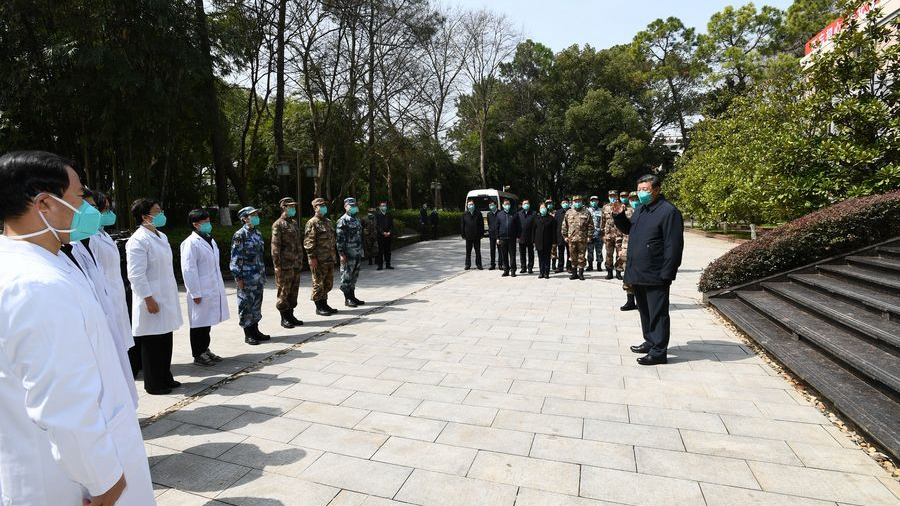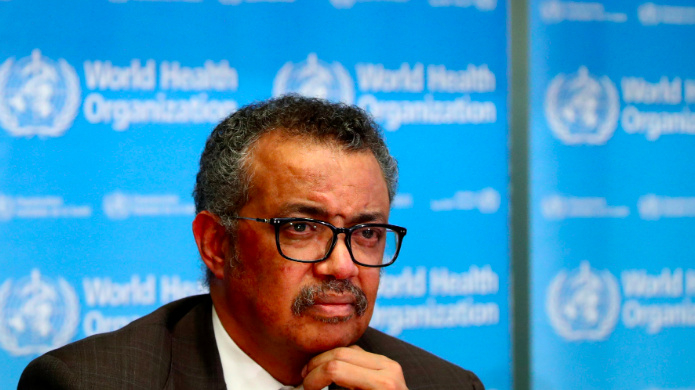
President Xi Jinping meets with medic representatives, sends regards and expresses sincere gratitude to them at Huoshenshan Hospital in Wuhan, March 10, 2020. /Xinhua
President Xi Jinping meets with medic representatives, sends regards and expresses sincere gratitude to them at Huoshenshan Hospital in Wuhan, March 10, 2020. /Xinhua
Editor's Note: Iram Khan is a Pakistan-based commentator on international and commercial affairs. The article reflects the author's opinions, and not necessarily the views of CGTN.
In a surprising development in the fight against COVID-19, Chinese President Xi Jinping landed in the nation's worst-hit city Wuhan on March 10, 2020. As the rest of the world is bracing for quarantines, event cancellations, and travel restrictions, China finally appears to have defeated the virus.
That's exactly what the president's visit conveyed. Almost all foreign media outlets got the cue when the most important person arrived in supposedly the most dangerous city in China. The visit was aimed at inspecting the ongoing prevention and control campaign in Hubei Province and its capital Wuhan, and it delivered a clear and strong message.
As countries outside China are currently grappling with a rapid coronavirus spread in their own countries, there's something they may be able to learn from the decisive and robust response given by the Chinese leadership to contain the pandemic in the country.
President Xi had been in close supervision of the crisis since its onset. He convened multiple meetings of the Standing Committee of the Political Bureau of the CPC Central Committee from January 7 to March 2 and emphasized resolute efforts at all levels.
He has also been visiting control and research work facilities in Beijing as well to stress upon the seriousness of the epidemic. His team of top government officials went to neighborhoods in Wuhan days before his visit and Premier Li Keqiang – assigned to head the leading group of the CPC Central Committee on COVID-19 – has been at the forefront while guiding COVID-19 control specialists and providing them with all the requisite support.
President Xi's engagement in the situation has been remarked upon more than once by the Director-General of the World Health Organization. Tedros Adhanom Ghebreyesus, who is coordinating the global exertion in containing the virus, thinks highly of Xi's "personal guidance and deployment" during these testing times.

WHO Director-General Tedros Adhanom Ghebreyesus attends a news conference on the novel coronavirus in Geneva, Switzerland, February 28, 2020. /Reuters
WHO Director-General Tedros Adhanom Ghebreyesus attends a news conference on the novel coronavirus in Geneva, Switzerland, February 28, 2020. /Reuters
Observers at the international level are weighing Xi's visit to Wuhan as the turning point in eradicating COVID-19. It is also being regarded as a sign that the nation's leadership actually has victory in sight. A trip to the epicenter projected the hard-earned confidence that the government now has in the emergency mechanisms it had invoked.
The effect of the visit was immediately seen in the Chinese market. Shares jumped as stockholders took it as an explicit indication of the aversion of the crisis.
With less than 100 new cases in recent days – as compared to 2,000 three weeks ago – this might well be the end. As the situation is edging toward normalcy, the national machinery is gearing into motion. Carl Minzner, a China scholar at Fordham Law School in New York explained to The Guardian that the visit "communicates the message to China's citizens that it is safe to go back to work."
During the resumption of business activities, the fight is shifting to control imported cases of the virus as other countries are striving to match China's extensive measures. Since the top-down implementation approach of the Chinese government is not adopted by many other countries, they might not be as efficient in their containment operations. This increases the possibility of the virus striking the Chinese mainland once again.
While there are improving reports from South Korea, Italy announced on Monday that it is trying to implement a nationwide quarantine. Other countries like Iran, Australia and the U.S. are equally struggling to implement safeguards that suit their domestic conditions.
By limiting the virus's spread, China bought valuable time for the maturation of several candidate vaccines. As soon as an antidote is finalized, we can expect an immediate improvement in the situation worldwide. Till that time, the countries most affected can take an example from Chinese leadership's active role in mitigating the effects of this global challenge.
(If you want to contribute and have specific expertise, please contact us at opinions@cgtn.com.)